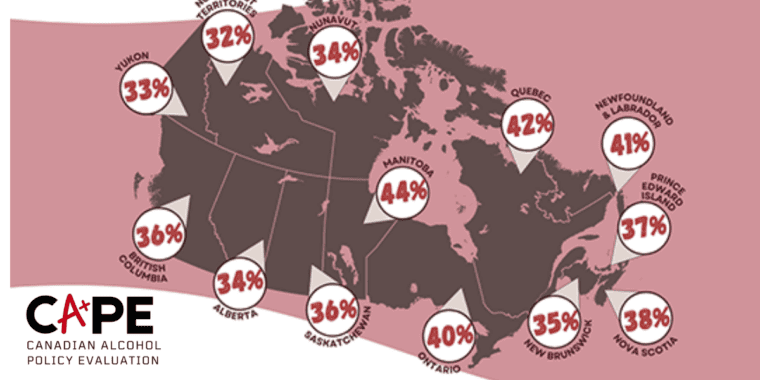
It started with an idea: what if people from across Canada, and across sectors, had a place they could come together to strengthen alcohol policy? It was a concept we heard clearly during the second round of the Canadian Alcohol Policy Evaluation (CAPE) project six years ago and has since blossomed into a large and dynamic community of practice (CoP). As outlined in our recent paper in the Canadian Journal of Public Health, we’re hoping this CoP can serve as a model for how to meaningfully engage a wide range of people interested in public-health initiatives.
Why a community of practice?
The Canadian Institute for Substance Use Research (CISUR) at the University of Victoria has conducted the CAPE project, an evaluation of evidence-based, public-health-focused alcohol policies in Canada, three times: 2012, 2019 and 2022. During the 2019 evaluation, the research team heard from stakeholders and partners about a need for a place where people interested in alcohol policy (from diverse geographic locations and sectors) could share knowledge with the goal of advancing policies that supported public health. In response, the CAPE CoP was born.
What does the CAPE CoP offer?
The CAPE CoP offers an email listserv, research presentations, roundtable discussions, policy forums, and networking sessions related to alcohol policy. Online events are offered every 4-6 weeks, featuring CoP members as presenters and panellists, with dedicated time for discussion. There are also currently two active working groups on the topics of alcohol warning labels and alcohol strategies that meet regularly. Since its launch in 2022, the CoP has hosted over 30 online events on topics ranging from alcohol pricing and taxation to warning labels to local government alcohol policies. Presentation recordings and slides from past events are publicly available. There is no cost to join, and members can participate in whatever capacity works best for them.
Who does the CAPE CoP serve?
CoP members include those working in public health, alcohol regulation, justice and public safety, local government/community sectors, as well as non-governmental organizations, people with lived and living experience of alcohol harms, and researchers. One of our major aims with the CoP was to go beyond a typical webinar series by providing a forum for members to actively participate in sharing their expertise, with all voices respected and heard. Co-creation of webinars and events supports non-hierarchical, two-way relationships between researchers, practitioners and community members, that better support exchange of ideas and knowledge.
Another essential element of the CoP for both organizers and the membership was freedom from industry influence. Potential members must declare they have not been paid by, affiliated with, or received funding from alcohol, gambling, tobacco or cannabis industry organizations.
How has the CAPE CoP evolved?
Three years on, membership continues to grow with over 600 members from all 13 of Canada’s provinces and territories, as well as outside of Canada. In addition to offering online events, the coordinating team has provided support for member-driven initiatives. For example, the CoP has engaged in various letter-writing campaigns, such as calling on the Canadian government to support alcohol excise tax adjustments and support for Ireland’s Public Health (Alcohol) Act labelling regulations. The CAPE team has supported these initiatives through information sharing, providing evidence that helps organizations draft a well-informed letter, and facilitating connections between individuals and organizations who may wish to engage in joint advocacy efforts.
One of the keys to the CoP’s success has been the well-resourced coordination team, which has capacity to respond to members in a timely and thoughtful way, foster trusting relationships, facilitate networking, and support member-driven initiatives. This offers a consistent point of contact for CoP members and ensures follow-up between meetings and events to maintain momentum.
What impacts has the CAPE CoP had?
The benefits and impacts experienced by members of the CoP include the convenience of online recorded sessions, the diversity of perspectives among the membership, the ability to easily share resources, and the opportunity to collaborate across jurisdictions and sectors. Feedback surveys show consistently high satisfaction among members with the CoP offerings.
Some members shared that their participation in the CoP increased awareness of alcohol policy issues and shifted conversations for their team, organization or community; helped them make policy recommendations; informed the creation of local resources and materials; and led to new contacts with other organisations.
The CoP has also strengthened CISUR’s research; CoP members played a significant role providing valuable input that improved the knowledge exchange materials (i.e., reports, infographics, presentations) and reach of the CAPE project results released in 2023.
What’s next?
There are opportunities to build on the success of the CoP by increasing engagement with priority groups and enhancing offerings. For example, increasing the number of members who identify as people with lived and living experience of alcohol harms, as people with lived and living experience of substance use are often under-represented in policymaking, as well as providing online events on topics such as how to build relationships across sectors, counter industry messaging, and influence the discourse around alcohol in the media and public settings.
As we reflect on the three years since the CAPE CoP was launched, it is clear it is addressing a need for knowledge sharing and collaboration. We are seeing greater support for alcohol policy initiatives in many jurisdictions, new opportunities arising for collaboration, and strong policy advocates emerging. We hope that others may be inspired to apply a similar CoP model to other regions interested in alcohol policy, or public health initiatives.
You can find more information about CAPE CoP membership online here.
Written by Amanda Farrell-Low and Elizabeth Farkouh, Canadian Institute for Substance Use, University of Victoria.
All IAS Blogposts are published with the permission of the author. The views expressed are solely the author’s own and do not necessarily represent the views of the Institute of Alcohol Studies.
